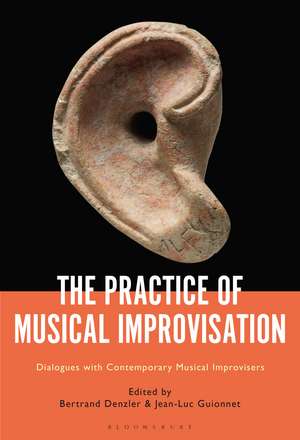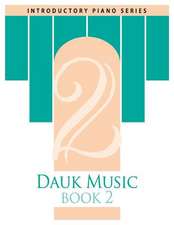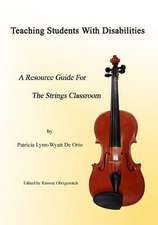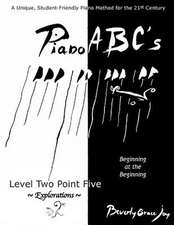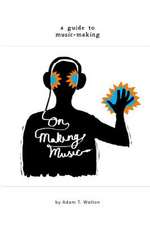The Practice of Musical Improvisation: Dialogues with Contemporary Musical Improvisers
Editat de Bertrand Denzler, Jean-Luc Guionneten Limba Engleză Paperback – 28 iul 2021
| Toate formatele și edițiile | Preț | Express |
|---|---|---|
| Paperback (1) | 216.79 lei 6-8 săpt. | |
| Bloomsbury Publishing – 28 iul 2021 | 216.79 lei 6-8 săpt. | |
| Hardback (1) | 568.22 lei 6-8 săpt. | |
| Bloomsbury Publishing – 8 ian 2020 | 568.22 lei 6-8 săpt. |
Preț: 216.79 lei
Preț vechi: 274.43 lei
-21% Nou
Puncte Express: 325
Preț estimativ în valută:
41.51€ • 42.82$ • 34.40£
41.51€ • 42.82$ • 34.40£
Carte tipărită la comandă
Livrare economică 20 februarie-06 martie
Preluare comenzi: 021 569.72.76
Specificații
ISBN-13: 9781501384653
ISBN-10: 1501384651
Pagini: 224
Dimensiuni: 152 x 229 x 22 mm
Greutate: 0.3 kg
Editura: Bloomsbury Publishing
Colecția Bloomsbury Academic
Locul publicării:New York, United States
ISBN-10: 1501384651
Pagini: 224
Dimensiuni: 152 x 229 x 22 mm
Greutate: 0.3 kg
Editura: Bloomsbury Publishing
Colecția Bloomsbury Academic
Locul publicării:New York, United States
Caracteristici
Includes interviews with both experienced musicians (e.g. Phil Durrant, Rhodri Davies, Eddie Prévost, John Butcher, Evan Parker, Axel Dörner, Phil Minton, Radu Malfatti, Otomo Yoshihide, Bill Dixon and Annette Krebs) as well as musicians newer to the field
Notă biografică
Bertrand Denzler and Jean-Luc Guionnet are both well-known improvisational musicians and active composers. They have worked with countless improvising musicians across the globe and have published dozens of recordings with some of the most influential labels in the field.
Cuprins
AcknowledgementsPreface1 Starting an Improvisation2 The Mental State During an Improvisation3 Listening to the Other Musicians, the Human Factor, the Strategies4 Memory and Form5 Process versus Aesthetic Result, Improvisation as a Tool to Make Music versus Music as a Tool to Improvise, Improvisation versus Composition 6 Talking about Improvisation and Music in General7 Non-idiomatic Improvisation, Experimental Music, Genre Labels8 Silence and Dynamics9 Sounds as Material10 Instrument and Technique11 Solo Improvisation12 The Concert Situation, the Audience, the Published Recordings13 Some Political Issues14 How I Came to Play This Music15 How I Listen to Music, the Music I Listen to, Some Hidden Gardens16 MiscellaneousList of the Musicians InterviewedAn Ear for Discord: Improvise, They SayDiagrams
Recenzii
There's much to be learned from these interviews, and their artful construction. The book is a great resource, and itself an artistic creation.
The Practice of Musical Improvisation is not a treatise on improvisation, but an investigation into its axioms and stakes, a series of interrogations of its main contemporary suspects. It thus proposes a set of endogenous discourses, firmly rooted in practice, and whose diversity is the only force capable of revealing the process of improvisation.
Filled with poetic and provocative thoughts culled from a wealth of interviews with creative practitioners, this book offers substantive grist for the discursive mill of improvisation studies. Key ontological and epistemological questions arise, but the experiential dimension of how improvisation feels shines through most clearly in these engaging pages. Initially not having the speaker's name attached to their words may feel disorienting, but it allows the ideas to swirl around untethered from the personalities who conjured them and offers the initiated reader a chance to guess who said what.
Nearly forty years ago, Derek Bailey published Improvisation: Its Nature and Practice in Music, which explored musical improvisation through interviews with a wide range of practitioners. Denzler and Guionnet's The Practice of Musical Improvisation renews Bailey's project, gathering illuminating and candid remarks from some of the most prominent improvisers working today. The book delves deeply into the creative process, the practice of listening and their social and political contexts, revealing the complexity and joy of improvised music.
The Practice of Musical Improvisation is not a treatise on improvisation, but an investigation into its axioms and stakes, a series of interrogations of its main contemporary suspects. It thus proposes a set of endogenous discourses, firmly rooted in practice, and whose diversity is the only force capable of revealing the process of improvisation.
Filled with poetic and provocative thoughts culled from a wealth of interviews with creative practitioners, this book offers substantive grist for the discursive mill of improvisation studies. Key ontological and epistemological questions arise, but the experiential dimension of how improvisation feels shines through most clearly in these engaging pages. Initially not having the speaker's name attached to their words may feel disorienting, but it allows the ideas to swirl around untethered from the personalities who conjured them and offers the initiated reader a chance to guess who said what.
Nearly forty years ago, Derek Bailey published Improvisation: Its Nature and Practice in Music, which explored musical improvisation through interviews with a wide range of practitioners. Denzler and Guionnet's The Practice of Musical Improvisation renews Bailey's project, gathering illuminating and candid remarks from some of the most prominent improvisers working today. The book delves deeply into the creative process, the practice of listening and their social and political contexts, revealing the complexity and joy of improvised music.
